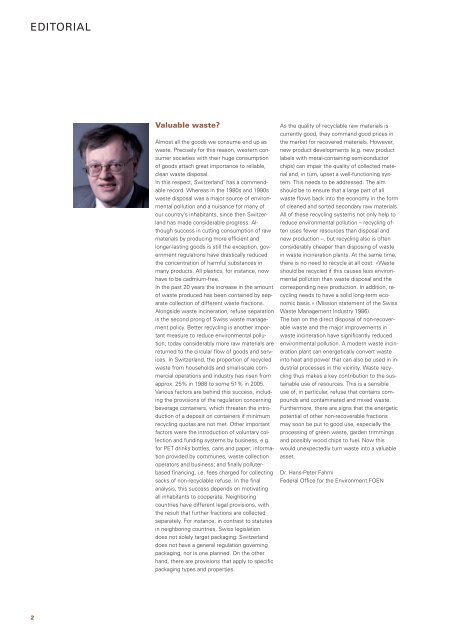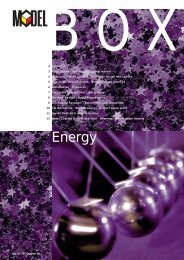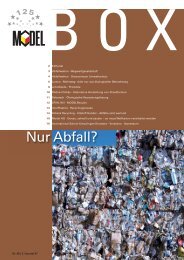Only waste? - Model Holding AG
Only waste? - Model Holding AG
Only waste? - Model Holding AG
- TAGS
- www.modelgroup.com
You also want an ePaper? Increase the reach of your titles
YUMPU automatically turns print PDFs into web optimized ePapers that Google loves.
EDITORIAL<br />
2<br />
Valuable <strong>waste</strong>?<br />
Almost all the goods we consume end up as<br />
<strong>waste</strong>. Precisely for this reason, western consumer<br />
societies with their huge consumption<br />
of goods attach great importance to reliable,<br />
clean <strong>waste</strong> disposal.<br />
In this respect, Switzerland’ has a commendable<br />
record. Whereas in the 1980s and 1990s<br />
<strong>waste</strong> disposal was a major source of environmental<br />
pollution and a nuisance for many of<br />
our country’s inhabitants, since then Switzerland<br />
has made considerable progress. Although<br />
success in cutting consumption of raw<br />
materials by producing more efficient and<br />
longer-lasting goods is still the exception, government<br />
regulations have drastically reduced<br />
the concentration of harmful substances in<br />
many products. All plastics, for instance, now<br />
have to be cadmium-free.<br />
In the past 20 years the increase in the amount<br />
of <strong>waste</strong> produced has been contained by separate<br />
collection of different <strong>waste</strong> fractions.<br />
Alongside <strong>waste</strong> incineration, refuse separation<br />
is the second prong of Swiss <strong>waste</strong> management<br />
policy. Better recycling is another important<br />
measure to reduce environmental pollution;<br />
today considerably more raw materials are<br />
returned to the circular flow of goods and services.<br />
In Switzerland, the proportion of recycled<br />
<strong>waste</strong> from households and small-scale commercial<br />
operations and industry has risen from<br />
approx. 25% in 1988 to some 51% in 2005.<br />
Various factors are behind this success, including<br />
the provisions of the regulation concerning<br />
beverage containers, which threaten the introduction<br />
of a deposit on containers if minimum<br />
recycling quotas are not met. Other important<br />
factors were the introduction of voluntary collection<br />
and funding systems by business, e.g.<br />
for PET drinks bottles, cans and paper; information<br />
provided by communes, <strong>waste</strong> collection<br />
operators and business; and finally polluterbased<br />
financing, i.e. fees charged for collecting<br />
sacks of non-recyclable refuse. In the final<br />
analysis, this success depends on motivating<br />
all inhabitants to cooperate. Neighboring<br />
countries have different legal provisions, with<br />
the result that further fractions are collected<br />
separately. For instance, in contrast to statutes<br />
in neighboring countries, Swiss legislation<br />
does not solely target packaging: Switzerland<br />
does not have a general regulation governing<br />
packaging, nor is one planned. On the other<br />
hand, there are provisions that apply to specific<br />
packaging types and properties.<br />
As the quality of recyclable raw materials is<br />
currently good, they command good prices in<br />
the market for recovered materials. However,<br />
new product developments (e.g. new product<br />
labels with metal-containing semiconductor<br />
chips) can impair the quality of collected material<br />
and, in turn, upset a well-functioning system.<br />
This needs to be addressed. The aim<br />
should be to ensure that a large part of all<br />
<strong>waste</strong> flows back into the economy in the form<br />
of cleaned and sorted secondary raw materials.<br />
All of these recycling systems not only help to<br />
reduce environmental pollution – recycling often<br />
uses fewer resources than disposal and<br />
new production –, but recycling also is often<br />
considerably cheaper than disposing of <strong>waste</strong><br />
in <strong>waste</strong> incineration plants. At the same time,<br />
there is no need to recycle at all cost: «Waste<br />
should be recycled if this causes less environmental<br />
pollution than <strong>waste</strong> disposal and the<br />
corresponding new production. In addition, recycling<br />
needs to have a solid long-term economic<br />
basis.» (Mission statement of the Swiss<br />
Waste Management Industry 1986).<br />
The ban on the direct disposal of non-recoverable<br />
<strong>waste</strong> and the major improvements in<br />
<strong>waste</strong> incineration have significantly reduced<br />
environmental pollution. A modern <strong>waste</strong> incineration<br />
plant can energetically convert <strong>waste</strong><br />
into heat and power that can also be used in industrial<br />
processes in the vicinity. Waste recycling<br />
thus makes a key contribution to the sustainable<br />
use of resources. This is a sensible<br />
use of, in particular, refuse that contains compounds<br />
and contaminated and mixed <strong>waste</strong>.<br />
Furthermore, there are signs that the energetic<br />
potential of other non-recoverable fractions<br />
may soon be put to good use, especially the<br />
processing of green <strong>waste</strong>, garden trimmings<br />
and possibly wood chips to fuel. Now this<br />
would unexpectedly turn <strong>waste</strong> into a valuable<br />
asset.<br />
Dr. Hans-Peter Fahrni<br />
Federal Office for the Environment FOEN
















